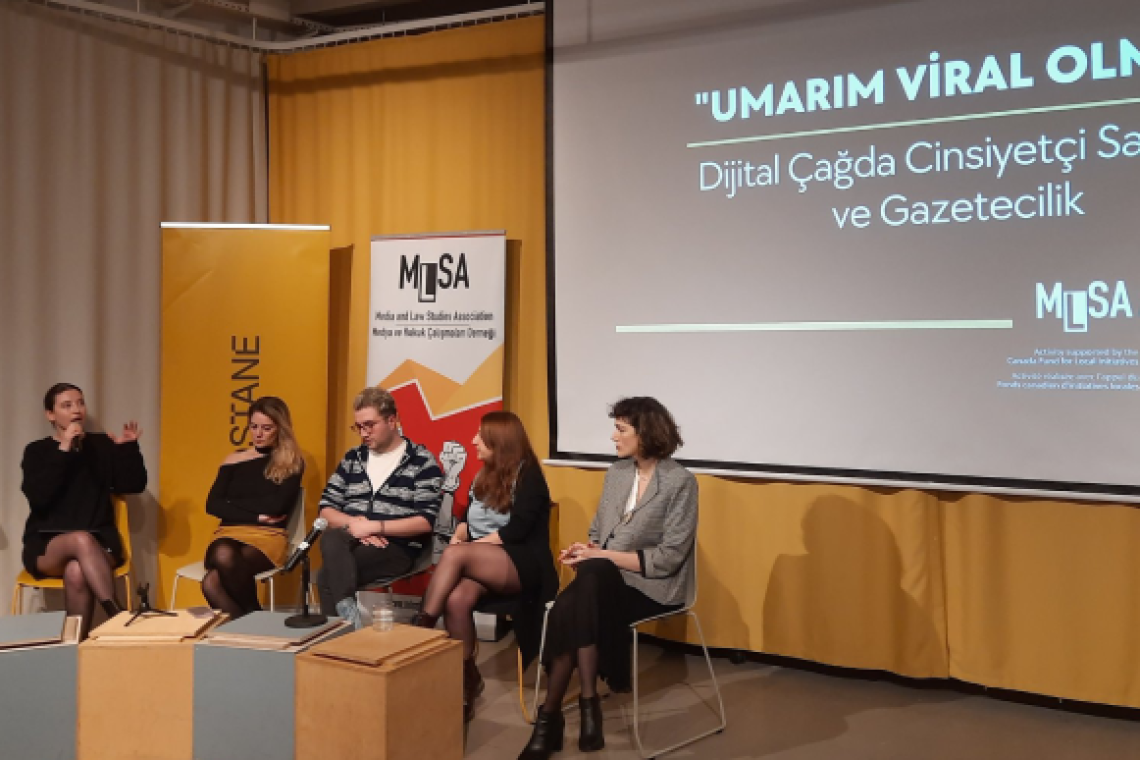MLSA launched its short documentary "I hope it doesn't go viral: Journalism and Sexist Attacks in Digital Age," which thematizes cyberbullying against journalists on online platforms and which was prepared with the support of the Canada Fund for Local Initiatives. MLSA’s documentary titled "I hope it doesn't go viral: Journalism and Sexist Attacks in Digital Age,” which was prepared by journalist Çiçek Tahaoğlu and cinematographer Yiğit Akbıyık, was launched on Wednesday evening, at 7 pm in Postane Galata, Istanbul. The documentary includes interviews with the journalists Sibel Yükler, Rengin Arslan, Burcu Karakaş, Yıldız Tar, Abeer Sady and the psychologist Aslı Avşar. Following the screening of the documentary, a panel was held under the moderation of journalist Hazal Sipahi with the producer Çiçek Tahaoğlu and the protagonists Burcu Karakaş, Sibel Yükler, Yıldız Tar and Aslı Avşar. During the panel, the journalists talked about the experiences they have made with online violence.
Sibel Yükler: “Online violence against women and LGBTI+ journalists is rarely talked about”
At the beginning of the panel discussion, Çiçek Tahaoğlu underlined that the documentary is an important record of the conditions under which women journalists work. However, she also noted: “Perhaps the documentary will be watched more than by anyone else by those cyberbullies who attack women journalists online.” Taking the word afterwards, Sibel Yükler said that online violence against women and LGBTI+ journalists is rarely talked about and added that due to the heavy pressure on journalists in general, this issue has not yet been addressed.  Fotoğraf: Pınar İlkiz Mentioning that “I hope it doesn’t go viral” may be the first documentary on this subject in Turkey, Yükler also talked about how she started to apply a lot of self-censorship after having been exposed to online attacks: “Sometimes my heart is racing as I am sending news to my editor that may resonate and cause controversies. My expression ‘I hope it doesn’t go viral,’ which gave the documentary its title, is actually a symptom of these heart palpitations.”
Fotoğraf: Pınar İlkiz Mentioning that “I hope it doesn’t go viral” may be the first documentary on this subject in Turkey, Yükler also talked about how she started to apply a lot of self-censorship after having been exposed to online attacks: “Sometimes my heart is racing as I am sending news to my editor that may resonate and cause controversies. My expression ‘I hope it doesn’t go viral,’ which gave the documentary its title, is actually a symptom of these heart palpitations.”
Yıldız Tar: “Rather than individual efforts, political will is required”
LGBTİ+ haber portalı Kaos GL’nin Genel Yayın Yönetmeni Yıldız Tar, genellikle üç farklı grup tarafından hedef alındığını belirtti: Yıldız Tar, Editor-in-Chief of the LGBTI+ rights association KAOS GL, stated that they are usually targeted by three different groups:  “...political islamists, persons more nationalists than them, and so-called trans-exclusionary radical feminists, many of whom remain anonymous. Even when posting news in response to anti-LGBTI+ campaigns, the attackers continue to base their attacks on gender and/or sexual orientation.” With regards to his reaction to those attacks, Tar remarked: “I don’t hold grudges, I hire a lawyer.” He also added that rather than individual efforts, political will is required in order to end the attacks by perpetrators such as troll groups.
“...political islamists, persons more nationalists than them, and so-called trans-exclusionary radical feminists, many of whom remain anonymous. Even when posting news in response to anti-LGBTI+ campaigns, the attackers continue to base their attacks on gender and/or sexual orientation.” With regards to his reaction to those attacks, Tar remarked: “I don’t hold grudges, I hire a lawyer.” He also added that rather than individual efforts, political will is required in order to end the attacks by perpetrators such as troll groups.
Burcu Karakaş: “It is important to file criminal complaints”
Journalist Burcu Karakaş, who works for the German public broadcaster Deutsche Welle Turkish, said: “As the number of followers on social media increases, you can reach more people; at the same time, however, the discrediting campaigns rise. For example, with the women’s rights and LGBTI+ movement growing day by day, the attacks against these movements rise, too.” Reminding of the fact that cyberbullies are not people who are outside society, Karakaş also recounted: “When I looked into the profiles of trolls on social media who had threatened me with rape, I realized that also my friends were following them.”
Psychologist Aslı Avşar: “Cyberbullying can cause trauma”
Psychologist Aslı Avşar underlined the need for social and legal sanctions to protect journalists from online violence: “Journalists should not shy away from protecting themselves psychologically. It can reduce the rate of attacks when journalists know how to protect themselves. Fantasies and actions are separate; most bullies do not implement their threats. “When journalists undervalue cyberbullying, which is a form of violence, then they are trying to suppress the violence, thinking it is temporary. But this does not make the violence pass. It can turn into a trauma that comes up again in the future and may have consequences in the long run.”



